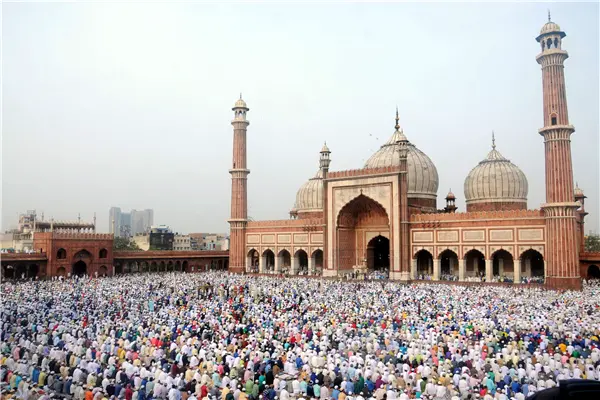Muslims in India Thursday celebrated the festival of Eid-ul-Fitr with religious fervor and gaiety.
Festival of Eid-ul- Fitr marks the end of Muslim holy month of fasting (Ramadan) and beginning of new month in lunar calendar.
Devout Muslims in the capital city of New Delhi gathered in prayer grounds (open spaces designated for offering special prayers on Eid) and mosques in the morning and offered Eid-ul- Fitr prayers.
Muslims pray in congregation in Bhopal. Photo By: Xinhua Agency
The biggest congregations were held at Jama Masjid (grand mosque) in old Delhi, Fatehpuri Masjid and Shahi Eidgah where men were seen shoulder-to-shoulder in prayers, bowing down in direction of the Kabba at Muslim holy city of Mecca in Saudi Arabia.
Reports of similar congregational prayers poured in from most Indian cities including Mumbai, Hyderabad, Lucknow and Agra.
The people including women and children dressed in new clothes were seen hugging each other and exchanging Eid greetings during the gatherings.
Contrary to the normal practice of celebrating Eid-ul-Fitr across South Asia on a single date - day after Saudi Arabia, this year Pakistan and India celebrated the festival on two different dates.
Authorities in Pakistan announced the festival after crescent of Shawwal - another Islamic month - was sighted Tuesday evening. However, authorities in India and neighbouring Bangladesh said they have failed to sight the crescent and declared the festival would fall on Thursday.
Muslims follow lunar calendar, according to which months are either of 29 or 30 day duration.
The Muslim (lunar) calendar advances by 10 days every year in comparison to the Christian (solar) calendar which remains unchanged.
People in Indian-controlled Kashmir followed the announcement of Pakistan and celebrated the festival on Wednesday. Kashmiri Muslims subscribe more to the announcements of Islamabad as far as decisions about celebrating Eid or beginning of month of Ramadan are concerned.
In the region's twin capital cities of Srinagar and Jammu, thousands of people participated in the Eid prayers. Clashes and protests marred the celebrations in the restive region. Authorities had placed region's top separatist leaders including hardliner Syed Ali Geelani and moderate Mirwaiz Umar Farooq under house arrest, fearing their participation in prayers would trigger protest demonstrations in Srinagar. Mirwaiz was scheduled to lead the Eid prayers at Eidgah grounds.
Clashes broke out in Srinagar city and southern town of Anantnag after the culmination of Eid prayers. Angry youth threw stones on contingents of Indian police and paramilitary troopers after they tried to stop the protesters from taking out a march. Police fired warning shots and tear smoke shells to disperse the protesters, who were shouting anti-India and Pro-freedom slogans
Anti-India sentiment runs deep in the psyche of majority of Kashmiris. Separatists are demanding end of New Delhi's rule in the region.
Indian-controlled Kashmir has been reeling under conflict and violence since 1989. A guerrilla war is going on between militants and Indian troops stationed in the region.
The armies of India and Pakistan exchanged sweets on Line of Control (LoC) dividing Kashmir.
"The exchange of sweets is a testimony of goodwill from both the countries and is expected to go a long way in promoting harmony and bonhomie and will certainly strengthen the efforts towards maintaining peace and tranquility along the LoC," an Indian military spokesman said.
Eid is an official holiday in India. The southern Indian state of Kerala also celebrated Eid on Wednesday.
Muslims wear new clothes on Eid, offer special prayers and greet their friends and families. Pocket money and presents are given out to children to celebrate the festival.
The womenfolk prepare special foods and delicacies for the day. Even special delicacies and dishes are available at restaurants and in markets for the day.
Money is also distributed among the poor and needy. According to Islamic law Muslims are required to give 2.5 percent of their wealth to poor in form of charity.
(APD)
 简体中文
简体中文

